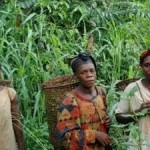
Oslo, Norway – Discovery of wide-spread illegal logging in Malaysia and Guyana has caused one of the world’s largest institutional investors to sell all its shares in Malaysian timber giant Samling Global.
The Norwegian Ministry of Finance announced today that the Norwegian Government Pension Fund has divested itself of 16 million shares of Samling Global, worth US $ 1.2 million. The Ministry of Finance also excludes the Israeli companies Africa Israel Investments Ltd. and Danya Cebus Ltd. from its investment portfolio, also on ethics grounds.
Samling Global is an integrated forest resource and wood products company that produces timber, plywood, veneer, furniture and palm oil.
The decision to drop Samling Global from the Norwegian Government Pension Fund was made after an investigation of Samling’s logging operations found the corporation responsible for systematic illegal logging in the East Malaysian state of Sarawak on the island of Borneo.
Minister of Finance Sigbjorn Johnsen said, “The Council on Ethics has assessed Samling Global, and concluded that the company’s forest operations in the rainforests of Sarawak and Guyana contribute to illegal logging and severe environmental damage. I have, therefore, chosen to follow the recommendation of the Council on Ethics and exclude the company from the GPFG’s investment portfolio.”
Based on field surveys, satellite image analysis, and evaluation of publicly available documentation, the Council on Ethics’ investigations documented extensive and repeated breaches of the license requirements, regulations and other directives governing the company’s forest operations in Malaysia and Guyana.
“Some of the violations constitute very serious transgressions, such as logging outside the concession area, logging in a protected area that was excluded from the concession by the authorities in order to be integrated into an existing national park, and re-entry logging without Environmental Impact Assessments,” the Council on Ethics found.
Samling says on its website, “Our logs and sawn timber come from forests with responsible forest management practices.” The company says it conducts logging with respect for rivers and water catchments and minimizes impact on the environment.
But in its assessment, the Council on Ethics placed particular emphasis on the extent of illegal logging and the environmental damage that occurs when laws and regulations are not observed. There is an “unacceptable risk of contributing to current and future severe environmental damage,” the Council concluded.
From its headquarters in Basel, Switzerland, the Bruno Manser Fund welcomed the Norwegian government’s decision and called on investors, finance institutions and timber traders worldwide to follow the Norwegian example and cut their business ties with Samling Global.
Named for a champion of Malaysia’s indigenous people, the late Bruno Manser, the charitable organization said today, “Samling is one of the companies that are responsible for the large-scale logging of Sarawak’s primary rainforests and for the destruction of the livelihood of the Penan and other indigenous communities.”
“We also express our gratitude to the Rainforest Foundation Norway for having brought up this issue with the Norwegian authorities,” said the BMF.
In the case of the Israeli companies, Africa Israel Investments Ltd. is the parent company of several subsidiaries with interests in property development, infrastructure and energy. The company holds a majority stake in Danya Cebus, a construction company involved in developing settlements in occupied Palestinian territory.
The Council on Ethics emphasizes that the construction of settlements in occupied areas is a violation of the Geneva Convention relative to the Protection of Civilian Persons in Time of War and that the Norwegian Government Pension Fund runs “an unacceptable risk of contributing to serious violations of individual rights in situations of war and conflict by investing in these two companies.”
Minister Johnsen said, “The Council on Ethics bases its recommendation on the fact that the international community is united in the view that the area east of the 1967 line is occupied territory and as such comes under the purview of the fourth Geneva Convention.”
“Several United Nations Security Council resolutions and an International Court of Justice advisory opinion have concluded that the construction of Israeli settlements in occupied Palestinian territory is prohibited under this Convention,” Johnsen said. “I have, therefore, accepted the recommendation of the Council on Ethics and am excluding Africa Israel Investments and Danya Cebus from the fund’s investment portfolio.”
Source: ENS Press Release dated August 23, 2010.













